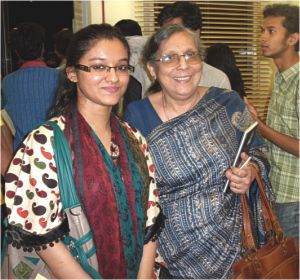Literature
Taking part in the Literary Adda
Sarzah Yeasmin
| |
 |
| |
A moment captured with Dr Niaz Zaman (R). |
April 6, 2012 evening, the Literary Adda at the American Centre was conducted by the Brine Pickles, a literary performance group. This Adda, which was a part of the three day long literary workshop, was facilitated by Professor Razia Sultana Khan (Head of Department of English, Independent University Bangladesh), Dr Niaz Zaman (fiction writer, translator and publisher), Dr Kaiser Haq- (poet, translator, essayist, critic and academician) and other distinguished literary persons, who were there to make the session more fruitful.
The highlights went on discussing the importance of research before working on any write up following the treatment of 1971 in the books written by this generation not having witnessed the real war. In this case Dr Niaz Zaman suggested that writers should keep distance in getting the story to appear more objective. For instance, a story based on 1971 could also have a war baby or house wife as a protagonist in the region safe from the outrages of war and therefore the storyline does not require active participation in the war. The need for social anthropology and oral history was also mentioned as an essential ingredient to the upholding of facts.
Dr Kaiser Haq, emphasised more on the skeleton of literature and fleshing it up with fiction and appointed on length of lines and stanza deviations by noting on Ezra Pound's 'In a station of the Metro' and Robert Frost's 'Stopping by Woods on a Snowy Evening.'
In the latter part of the session, the atmosphere continued to warm up as arguments on 'English Writing in Bangladesh' was set in motion. Some observers termed written English as a 'colonised use of language and way of expression' for a country like Bangladesh where writing in Bangla attracts more readers. Here the demarcation was made between the writers writing in Bangla and English. The motive of English writing was shown as a means to cross borders and as means to be cosmopolitan. It also came up that modern English associates with the English mediums are neither fully aware of the Bangla culture nor of the etiquettes of Western history and literature. Against these stereotypical views the mindsets belonging to the opposite notion suggested that if it was not written in English about 1971 or any other political or cultural issues, how the world would not have perceived our identity as a sovereign nation. Dr Niaz Zaman said that writers should write in the language they dream. If they do not dream in English then nobody is forcing them to write so. Further more Dr Razia Sultana shared about the time of her PhD in Nebraska where Americans only knew of a literary piece of one Bengali author- Begum Rokeya's 'Sultana's Dream,' which was her only work in English.
Eventually the intention was neither degrading Bangla nor English as a medium of expression since both languages play vibrant roles in their respective arenas. The language is not material, the concern should be placed on how the ideas are created and what effects that can have among the readers.
| 